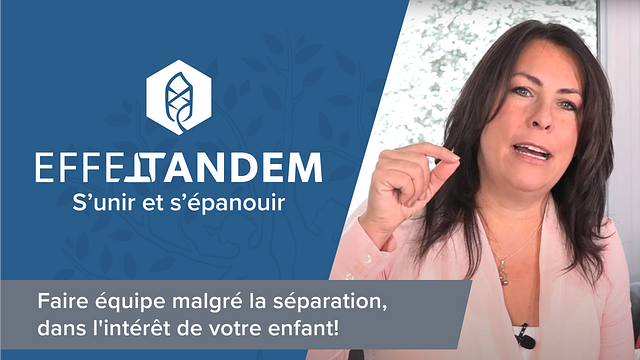You are about to separate or have just separated and, lately, you have been hearing a lot about the importance of co-parenting. You know, we may not be spouses anymore, but we're still going to be the parents of the children we brought into the world. It's so important for our children to feel that even if mom and dad don't love each other like lovers anymore, they're still going to be a parental team. But this is not always obvious, we agree. So what I invite you to do as soon as possible, either before the separation or just after the separation, is to try to put aside your feelings, the pain, the quarrels to sit down as a parental team and say to each other "from now on, how do we organize things?" So agreeing, both of you, on some ground rules, for example, that will be in both houses. It could be "what time do we put the kids to bed?", "what time do we do homework?", "what are the homework rules?" So agreeing on ground rules that will be similar on both sides.
Personally, I have been separated from my daughter's father since she was 10 months old. And in her younger years, her father and I would go out to eat at a restaurant once a year or twice a year together. And then when he had his new wife, we would do it with his wife to get the ground rules down. And that, despite the coldness or the difficulties of communication that we could have, always coming back to "what will be the impacts on our daughter?", "what is best for our daughter?" And since his wife also had two children, they're roughly the same age, we had to try to harmonize our rules a little bit. And that brings me to my second strategy. So the first strategy is to agree on the ground rules, maybe even put them in writing, and maybe have little meetings. My second strategy is that, as a parent, you have to put water in your wine; and sometimes, when you're separated, you have to put a lot of water in your wine; you have to step on your pride a little bit to say to yourself, "In my ideal world, I think my daughter should go to bed at 7:00 p.m., but her father on the other side puts the kids to bed at 8:30. What's worse, that my kid goes to bed and there's some kind of loyalty conflict, that there are two different rules and he has to adapt one week to the other in his sleep cycle because it's completely different, or I agree to compromise and finally we decide that we put them both to bed at 8?" It's not the ideal situation, but it will still be less ugly than having rules that are completely different from each other.
As a personal example, when my daughter was very young, her father and stepmother decided to teach the children not to put their elbows on the table. For me, I didn't think it was a priority in education, I even thought it might be a bit rigid. But for them, it was important. Then, the intention was good. Their value was to teach good table manners. I chose to get on board, too, so that my daughter wouldn't have a week where she put her elbows on the table, a week where she didn't, and then also so that she wouldn't perceive negatively the interventions of her father and stepmother. So my second thing is really that we need to put our pride aside and mourn the perfect interventions. It's not going to happen. So maybe to say to ourselves, "What's going to be the least worst, that my child is going to have two completely different sounds or do I just let it go a little bit?"
My third thing, and this is not easy and maybe I'm talking more to moms, is to trust. It's extremely difficult. When our children are younger, it's even worse, I think. It's extremely difficult to let go of our child and let them live half their life with the other parent in a situation where we don't have control, we lack information, we might be very, very, very tempted to want to know everything and when our child comes back, to ask a thousand questions, to absolutely want the other parent to give us reports on what they did, what activities, who they saw. Then, "I think that person is a bad influence, I don't want them to play with them". It's easy to become overprotective. It's understandable because when they're in our home, we still have more power. I encourage you parents to trust, not your ex, trust your child, their resilience, their ability to adapt to situations that are different from one environment to another.
Also trust the process and trust the education you are giving your child. Even if the other parent doesn't do the same thing as you, doesn't pass on the same values as you do, what you teach your children, they can't unlearn. If you teach your child the value of studying and putting effort into their studies, every other week, and the other parent doesn't make them do the homework too much, what you're teaching your child is going to carry over. It's going to take longer than if the values were conveyed in both environments, but still, in the end, trust your ability to pass on values to your children and pass on an education. I remind you that you have 18 years to educate children, so try to take a longer view. Your child may learn more resilience, resourcefulness, accountability. "My dad doesn't make me do my homework, but if I want to get good grades, I might have to do it on my own." So try to take a longer view. I know it's not easy, but it gets done.






